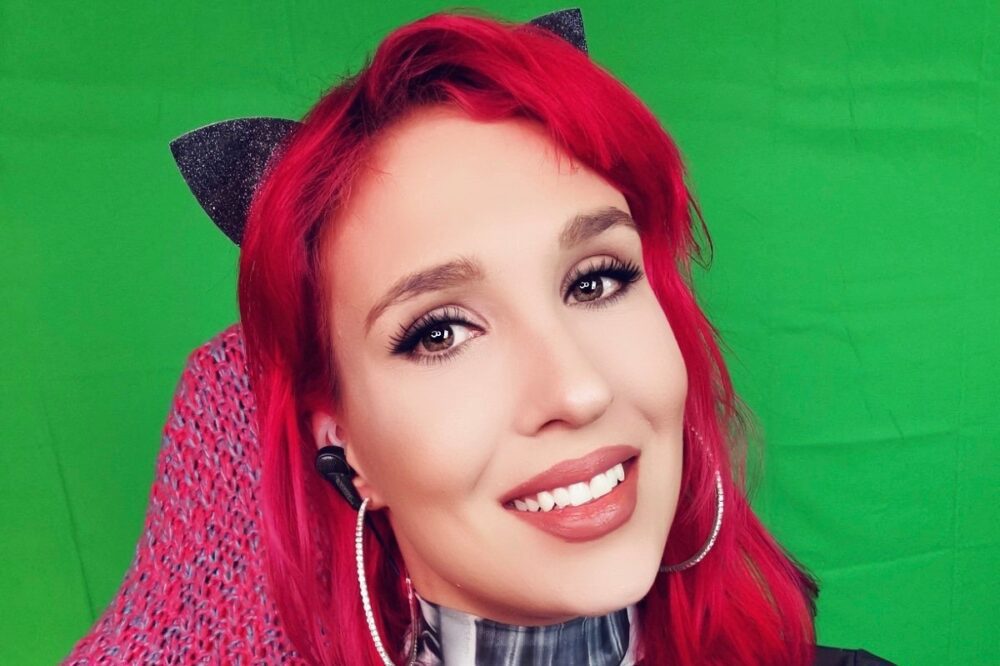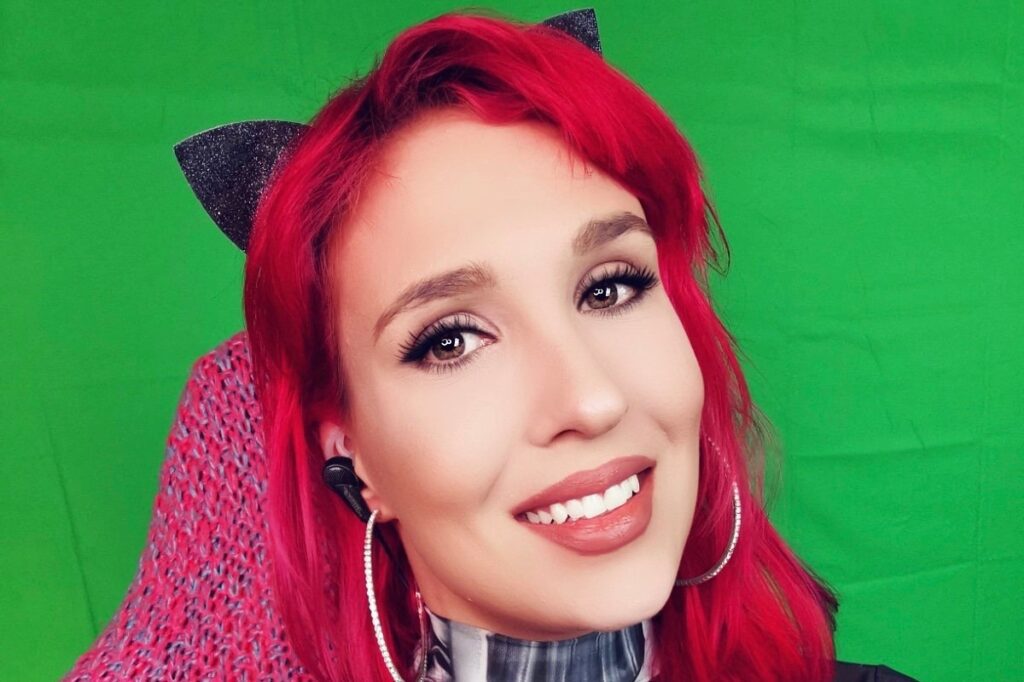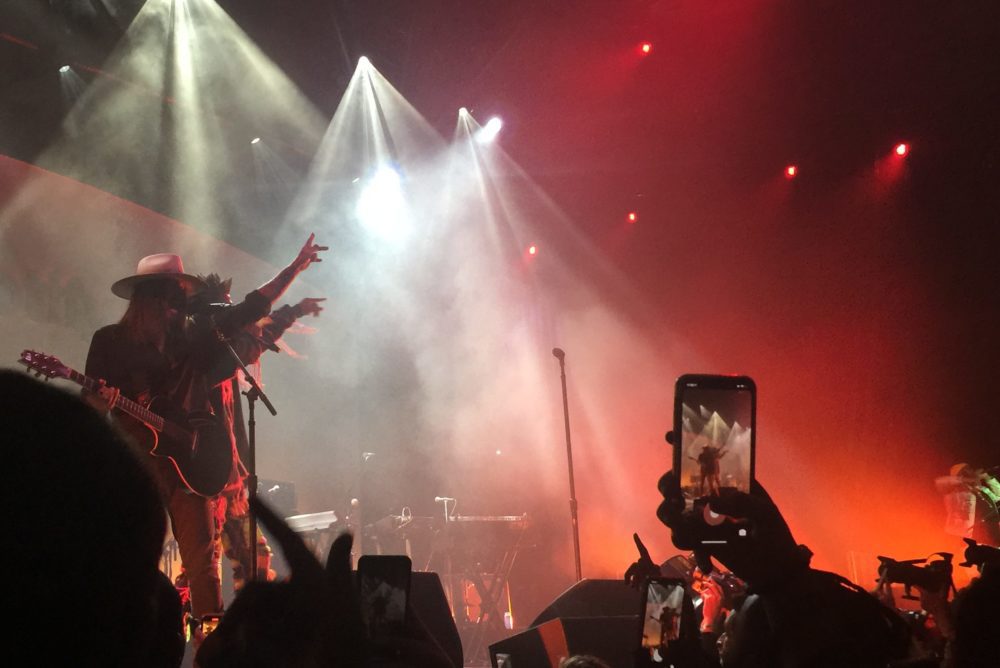

Artists are expected to pump out content non-stop now that most of the connection with their audience is digital. Twitch variety streamer SaraJazz got a head start toeing the line between content creation and musicianship after switching from full time touring to streaming in 2018, back when most people thought of Twitch exclusively as a gaming platform. As a seasoned jazz saxophonist she came to Twitch with a resume including full time touring, radio play, and a feature on Supermans Feinde single “Shine,” which now has more than a million views on YouTube.
SaraJazz’s channel quickly grew though her quirky blend of music, comedy and gaming while speaking three different languages – German, Portuguese and English. She streams on a weekly basis and co-hosts the talk show Music Exposed with fellow streamer TheSilenceNoise on Saturdays at 5pm EST. We chatted with SaraJazz about the changing digital landscape, dealing with burnout, and the future of live performance for her career and the industry as a whole.
AF: How did you get started as a musician and what got you into comedy?
SJ: Music has always been part of my life. I taught myself how to play basic piano as a kid. In early college I picked up the tenor saxophone as a hobby and taught myself how to play it. One day I wanted to buy an alto saxophone from a professional saxophonist – Michael Ausserbauer. When he heard me play he said I’d be dumb not to pursue a career as a full-time musician and invited me to play with him in his band. And because I’m very conscious about being dumb, I listened. And so my journey as a musician began.
Much later I started broadcasting on Twitch and discovered that people enjoyed my goofy sense of humor. I developed a passion for comedy and started not taking myself seriously. That was very refreshing for me because I came from jazz – which is a typically very serious scene. Slowly I started planning out comedy bits and started working on visuals that fit memes and jokes on my stream.
AF: When did you start streaming on Twitch and where did you get the idea for your channel?
SJ: Twitch was a gaming site in my mind. But I always thought, wouldn’t it be cool to play the sax live for people online? I never got around to doing so until July 2018 when I had a full month free of gigs. I saw WaxWaneMusic’s stream and was immediately hooked on the idea to also start streaming myself. So I researched basic streaming software, started the webcam on my gaming laptop, plugged in my USB mic and played some sax. I grew pretty fast and noticed people enjoy my comedy, so I slowly built my stream around it. My channel is always the result of a constant evolution of my state of mind. And being variety, thankfully my audience is very forgiving of me having different moods, ideas, or even switching content for a while. But comedy is always the root of my channel.
AF: Is SaraJazz a persona you’ve created, and alter ego? Or is she more a reflection of your true self?
SJ: SaraJazz is basically Sara on crack with a shield. It’s what I have inside of me and is part of me – but SaraJazz is much more obnoxious, talkative, and loud than Sara. Sara is an introvert who likes the quiet. SaraJazz was always part of me – it’s the part that got me through hard times in life, where I had to toughen up. It’s the part of me that doesn’t give a fuck. SaraJazz is one of the dudes but in a hot girl’s body. She has the humor of a horny trucker, is loud, and will tell you off if you piss her off. Lately I’m trying to show more of Sara to my audience, though. And I’m still figuring out if that’s a good idea or not.
AF: When did you switch from full-time touring to full-time streaming and why?
SJ: I switched pretty much three months into streaming. I know that’s very unusual. As an introvert I felt extremely comfortable streaming from my own studio at home and being able to just goof around. My stream grew very fast and I had a lot of big supporters who believed in my art. Since I had just left my main band half a year before (because I just didn’t identify with their stale jazz style anymore) and I was unhappy with the bands I was playing with, I canceled all contracts with bands and producers towards the end of 2018 and went solo on Twitch. It’s what saved my ass in 2020. I would’ve starved in the pandemic if I still relied on gigs and tours to pay my bills. Which is why I made videos to help musicians get started on Twitch to help them pay their bills.
AF: How has Twitch changed since you began your channel and how do you feel it’s changed positively and negatively in 2020?
SJ: Twitch has changed a lot since 2018. I feel like discoverability got worse but also more talented streamers joined. I’m not the biggest fan of how Twitch handles themselves. I do see a trend of Twitch becoming more and more corporate and PG, with more labels joining, content being forced into a more ad-friendly environment and Twitch implementing more child-friendly rules. As someone coming from jazz bars with mature humor I don’t feel as at home as I’d like and used to.
AF: Who are some of your favorite streamers?
SJ: To be honest I don’t watch as much Twitch as I should. In my free time I watch more YouTube. But when I do I watch people like TheSilenceNoise, NorthboundMatt, MoraisHD, Kaceytron, AliceTheLittleAlien, TheManChildShow, and JohnWolfe.
AF: How do you see the audience and culture of Twitch shifting as more musicians turn to it in place of live shows and touring?
SJ: When I joined Twitch I immediately understood that online live performance is the future. Especially coming from a pretty much dead scene: jazz. I do think professional musicians should turn more to online content, although with the pandemic in 2020 I predict there will be a higher demand for live shows and tours again once the lockdowns are over.
As for the Twitch culture, plenty of viewers still don’t realize there are music and art categories. Most people view Twitch as a gaming platform. The more gaming streamers support musicians and artists on the platform, the more viewers will understand there is a whole creative world on Twitch.
AF: When did you start Music Exposed and who have been some of your favorite guests?
SJ: Music Exposed started in March 2020. The idea was to support musicians on Twitch – regardless of their size – in a format similar to Saturday Night Live but with live audience interaction (chat). TheSilenceNoise and I had the idea at the same time and started working together.
What I love about the show is that we ask questions that are very “real.” We tackle topics like drug addiction, mental health, financial distress etc. DarthRipz for example told us he had to threaten a club owner with a gun to get paid after a gig. Then we have other guests who talked about how music helped them with addiction. Or Hammeta who was homeless while busking. Musicians are extremely interesting people. One of my favorite episodes didn’t even have me in it: Episode 25 with Existence130 and NorthboundMatt.
All episodes are available as podcasts on streaming services and also as video on YouTube, btw.
AF: As a variety streamer and content creator you have so many more things to keep updated on top of being a musician/artist. How do you stay organized and are there any social platforms you wish you didn’t have to be on?
SJ: Variety is extremely difficult. Someone once called doing variety on Twitch committing content suicide. And it is kind of true. When you do variety you have a lot of fluctuation in viewers and regulars. Which impacts your revenue. As a variety streamer you have to make sure people stay for your personality. Which is also one of the reasons why comedy is so important on my channel. If I did only one type of content I would be bored out of my mind, though. My mind is racing constantly and I get easily bored. And if I already work a job that is difficult and unsatisfying financially, then at least I want to have as much fun as possible.
I try to be on top of the newest games – especially horror, since that’s my specialty – and gaming news. I also talk about politics when important things are happening in the world. So I also research articles and info about that. I also try to be on top of what happens on Twitch and talk about that. Plus trying to keep up with the newest memes. All of that plus trying to make fresh jokes and coming up with new topics. The music part is the easy part. That’s what I trained for for years and I can play or improvise over any song. It’s basically a 24/7 job.
I wish I didn’t have to be on as many platforms as I do to try to stay relevant. The sheer amount of platforms is what takes all my time away: Twitter, Instagram, TikTok, Twitch, YouTube, Discord, etc. You need to be everywhere at all times to not be forgotten. The internet works fast. A year is ten years in internet time. A meme that was popular today will be old news and lame in three days.
AF: I’m new to streaming and it sounds so sterile being called a “content creator” – did you feel like this at first? Do you think there’s a better title for what you do?
SJ: I agree, it doesn’t really reflect anything. I prefer “content creator” to “influencer” though. “Influencer” sounds condescending to me. Although I hope I influence people in being kind and creative. On Twitter I call myself a professional troll and fabulous bitch. Let’s go with that as a title!
AF: Do you have any self-care routines or strategies to deal with burnout?
SJ: Ha, I wish. I’m slowly learning how to slow down and not work myself to death. I was always a workaholic. And the last two years have been hard for me mentally – so I dove into work like crazy. I worked nonstop. Built a community and never stopped. Now that I have a supportive partner who has gone through health issues due to being a workaholic himself, he helps me calm down and work less. Currently I’m working on recovering from my burnout in early 2020.
My biggest advice for streamers who start feeling tired: turn off viewer count! That’s very important for your mental health. Your performance is not gonna change if you’re performing for 20 or 2000 people – so just ignore the numbers and interact with chat as usual. As online creators we get caught up in numbers because that’s all that seems to matter: followers, likes, subs, viewers, growth. It’s part of this horrible mentality of “grind to get successful.” And I’m pretty sure many of us are tired of hearing stuck up business men in fancy suits say we need to work more to be more successful. No, motherfucker, we need to work efficiently. And if it’s not working, try a different strategy. Don’t work yourself to death! Don’t take the advice of “stream for 12 hours every day” when you have 3 viewers. That’s terrible advice.
AF: What would your advice be for someone who wants to become a full-time streamer now?
SJ: Don’t do it because you expect money or fame. Because you most likely won’t achieve that. Do it if you have a burning passion for your content and can handle the financial and mental tolls it takes.
Don’t quit your stable job just because you had a good month or two. Twitch fluctuates a lot and people run out of money. Try to go part-time with your regular job first, see how that works for a few months and once you have some money aside to survive a few months without any income and make enough on your platform to pay all your bills and more – do it! Basically just like any self-employed business. Actually TheSilenceNoise and I are thinking about offering courses on this matter, where we also review channels, help growth, and give business tips.
AF: Is there anything about the music industry as a whole that you would like to see change?
SJ: I will say the same as so many musicians will tell you: I wish it was less about money. The music industry is not an industry of creatives – it’s a lobby. It’s run by cigar smoking men in expensive robes who don’t even play a musical instrument. The gaming industry is slowly becoming that, too. Which is sad.
AF: Do you have plans to record and release any music in 2021?
SJ: This is where we go back to the question about burnout. Part of my recovery is writing more music again. By focusing on being a “content creator” so much I forgot to be a musician. I didn’t have time to write music anymore. And writing music requires quiet time for me, which I didn’t have since I started streaming. I am planning to release an EP with TheSilenceNoise in 2021 and once the pandemic is over I want to go on tour with him. My vision is prog rock with jazz elements, since we both have different backgrounds. But I imagine it working in a very unique and amazing way. I’m very stoked to go back on tour. We want to go on tour in both Europe and the US – anyone out there wanna book us in advance? I want to put together a band and a good show, so the audience has a unique and emotional experience. I can’t wait to start planning it once the world is back to normal.
More great livestreams this week…
2/5 Black Pumas via NPR Live Streams. 12pm ET RSVP HERE
2/6 “Black Laughs Matter” Virtual Comedy Show, 11pm ET, $0-20 RSVP HERE
2/6 Drew Citron via BABY.tv. 8pm ET, $5 RSVP HERE
2/9 Shakey Graves via Mandolin. 9pm ET, $20 RSVP HERE
2/9 JW Francis, Wendy Eisenberg, Haasan Barclay, Jolee Gordon, Raavi & The Houseplants via Twitch. 8pm ET RSVP HERE
2/10 Dead Leaf Echo via FIRSTLIVE. 5pm ET, $10 RSVP HERE
2/10 Snailmate via Twitch. 9pm ET RSVP HERE
2/11 Waxahatchee via Bandsintown PLUS. 10pm ET RSVP HERE
2/11 OHMME, AJ Marroquin, NNAMDI and more via The Hideout Online – a very special Valentine’s Day. 8pm ET, $10 RSVP HERE


